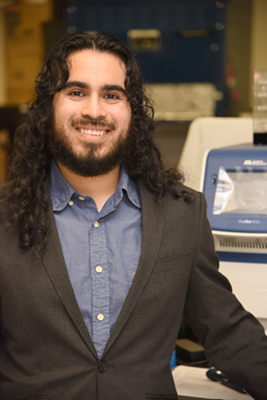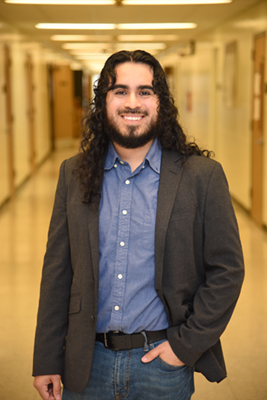Gonzalez nets prestigious fellowship in immunobiology at Yale
 Omar Gonzalez, a senior biology major at Lamar University from Port Neches who will graduate in May, has been accepted into the Ph.D. immunobiology program at Yale University to begin in August.
Omar Gonzalez, a senior biology major at Lamar University from Port Neches who will graduate in May, has been accepted into the Ph.D. immunobiology program at Yale University to begin in August.
“He has been awarded the Gruber Science Fellowship, the top honor a Ph.D. student can receive at Yale University,” said Ashwini Kucknoor, associate professor of microbiology. The fellowship is awarded to the most highly ranked applicants to Yale Ph.D. programs in the life sciences, cosmology, and astrophysics. The fellowship is the most prestigious award offered by Yale’s Graduate School of Arts and Sciences to incoming science students in recognition of their outstanding accomplishments and exceptional promise.
Gonzalez’s pursuit of doctoral work wasn’t originally in his plans. He first enrolled at Lamar Institute of Technology to pursue a track in biology with the intent of obtaining an associate’s degree in cardiovascular sonography. A moment of inspiration hit him while he was preparing for a class assignment that required reporting on current biomedical research.
“I soon came upon an article on the development of artificial skin grafts by growing skin cells on scaffolds of spider silk, which had been harvested directly from the same kind of spider that I could find in my own backyard,” Gonzalez said. As a boy, he had armed himself “with a stick to collect their beautiful golden silk” he said of the golden silk orb- weaver, more commonly known as a “banana spider.” Deeply impacted by this discovery, he read “more and more research articles” and soon found himself changing to Lamar University with sights set on a career in biomedical sciences.
“The highlight of my time at Lamar University has been the research opportunities I have had,” Gonzalez said. “I’ve been afforded the opportunity to work with several professors,” he said, “and each opportunity has provided a chance to see different ways to pursue research.”
"Omar has been one of the most conscientious, motivated, and responsible students that I have had in my research lab here at Lamar,” Kucknoor said. “I have no doubt in my mind that he will blossom into a well trained, competitive scientist when he graduates from Yale, and I am so happy for Omar."
In his second year at LU, he joined with Kucknoor, assisting a graduate student in a gene characterization study of Tritrichomonas feotus rhomboid proteases while learning basic principles of laboratory research. He then received a research grant from LU’s Office of Undergraduate Research for an independent project on “The Role and Significance of filamentous proteophosphoglycan in Leishmania amazonensis.” He also served as a team member for the biology department’s Texas Beach Watch program, collecting and analyzing levels of fecal coliforms in Southeast Texas beach waters.
 A member of the Ronald E. McNair Scholars Program at LU, Gonzalez was able to attend several workshops and conducted an independent research project “on the dangers of bacterial contamination of sprouts,” he said because of “the increasing tendency of individuals producing sprouts at home.” He presented his research at the Annual Ronald E. McNair Research Symposium at LU and at the Society for Advancing Chicanos/Hispanics and Native Americans in Science 2017 conference.
A member of the Ronald E. McNair Scholars Program at LU, Gonzalez was able to attend several workshops and conducted an independent research project “on the dangers of bacterial contamination of sprouts,” he said because of “the increasing tendency of individuals producing sprouts at home.” He presented his research at the Annual Ronald E. McNair Research Symposium at LU and at the Society for Advancing Chicanos/Hispanics and Native Americans in Science 2017 conference.
Gonzalez’s ultimate career goal is “translational biology” a discipline that bridges basic research and medical application by “taking something discovered in the lab and bringing it out to the clinical setting,” he said.
“In a lot of the research that I’m interested in I’ve seen an underlying theme of immunology,” Gonzalez said. “If you look at cardiovascular medicine today, immunology and inflammation is a big underlying theme. If you look at Alzheimer’s disease, inflammation is also an underlying theme. Autoimmune disease and diabetes have an underlying immunological component. Even our treatments for infectious disease are embedded in immunology.”
“Since I have an interest in a lot of these subjects, instead of going straight into research and trying to bring those things out into the field, into the market, I want to have a solid understanding of what is going on in all of these processes,” he said.
Thus, he is “taking a step back from my goal of translational biology to pursue studies in immunology at Yale,” a move that he feels will significantly enhance his future in translational biology.


